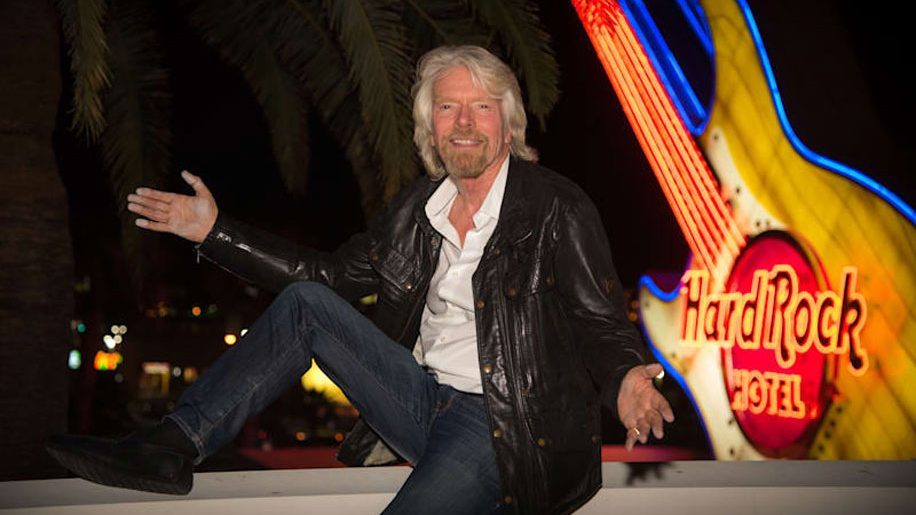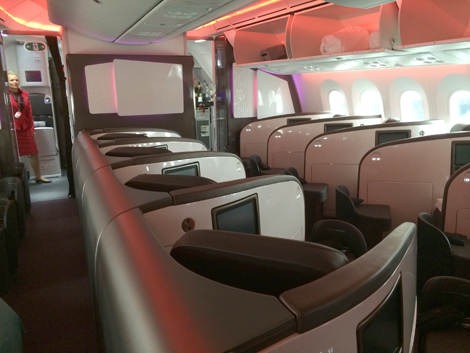
Virgin Atlantic founder Richard Branson and CEO Craig Kreeger have unveiled their vision of the airline’s future ahead of its first scheduled B787-9 Dreamliner flights from London Heathrow to Boston, which start on October 28.
The pair were speaking the day after Virgin’s first Dreamliner passenger flight – a special one-off hop from London Gatwick to Atlanta (click here to read our review).
Branson said: “It was about seven years ago that I went to Seattle to complete the deal for the B787 and, honestly, we expected to have it a few years ago and that has been quite tough on management at Virgin to have the main plane in the fleet not there.”
“Anyway, they have done a great job getting us through what has been quite a difficult time.”

He added: “I think the B787 is going to reduce our fuel costs dramatically, and it’s going to reduce our environmental footprint dramatically – by 2020 we should have reduced our carbon footprint by up to 30 per cent.”
It is also said to be 60 per cent quieter than an aircraft of a similar size, and, with support from HSBC, Virgin is working with LanzaTech to introduce fully sustainable, low-carbon jet fuel made from waste gas from steel and aluminium production.
Branson said: “We will fly at least one plane next year on 15 per cent LanzaTech fuel – as always, these things take longer than we would like, but next year we should have a chance of flying a plane and seeing how it goes.”
With Delta Air Lines now owing a 49 per cent stake in Virgin Atlantic, the two carriers will see their first transfer of operations this month, since the launch of their joint partnership earlier in the year.
From Sunday, Delta will be flying nonstop with a B767-300ER from London Heathrow to Los Angeles, one of two daily flights previously operated by Virgin. Meanwhile, Virgin Atlantic is operating its first-ever flights to Atlanta, having taken over one of Delta’s three daily services (although this will be on an A330-300 not the B787).
Virgin CEO Craig Kreeger said: “If you think about the route announcements we made two months ago, they really fell into two categories, they were additional services to markets we were doing well in such as New York, Miami, San Francisco and Los Angeles, or new services where we brought new connecting opportunities to UK-based customers by flying via a Delta hub on a Virgin Atlantic airplane.
“When we think about the future, we think about the customer experience and the network from the UK. The Delta relationship is so important for us because it gives us the opportunity to open up new destinations for our customers and exposes us to new US customers who might have chosen somebody else.”
Branson said: “At the moment, with Heathrow, if we want to do a new route we have to close a current route, we have no other choice as there are no slots at Heathrow. And that is unlike anywhere else in the world – in Australia, Virgin Australia has nearly 40 per cent of the market share against Qantas because we don’t have slot problems, but in Britain we are completely slot constrained so we are capped out at a tiny percentage. If a new runway is built at Heathrow I am absolutely certain there will be planes that are more fuel-efficient and there will be many routes in the Far East that Virgin Atlantic will want to fly to.”
Virgin has 16 B787-9s on order worth US$7 billion, and expects to take delivery of the remaining 15 of them by the end of 2018. (It intends to take another five B787-9 options.) The carrier will operate the Dreamliner on the Boston route six times a week, with further B787s deployed on London services to Washington DC plus New York Newark and JFK over the next five months.
What other routes might the Dreamliner fly? Kreeger said: “We will start with Boston and stay on the East Coast in the early days as we build up our number of pilots who have done landings with this plane. But it is a great airplane for places like Hong Kong and Johannesburg… The aircraft is great from an economy perspective on any route but is particularly good the longer you fly, as the fuel savings get bigger, so the West Coast and Asia are two great examples, but also it is a great product so we are putting it on markets where it will be valued.”
As for the timeline with regard to introducing the new B787-9s, Kreeger said: “We are replacing more than half our fleet in four years. [The Dreamliner] will make up almost 60 per cent of the fleet by the end of 2018 – it is a major step into the future for our airline.”
In terms of the customer experience, Kreeger commented: “The Upper Class seat is evolved and improved, the entertainment systems have interfaces that are really easy to use, the premium economy cabin is enhanced, and the economy seat is the best I have ever been in.”
He added: “One of the things I perhaps under-rated when flying on the B787 was the way you feel – it is flown at a higher relative humidity and a lower relative altitude, which makes you feel much less exhausted after a long flight, and as our cabin crew members told me, their feet weren’t swelling.
“It will be a great plane for customers and a great aircraft for our business. As we move into the future, we think the £300 million we have committed to spend on customer service improvements will move us up even further. I think for an airline like Virgin Atlantic, it is the experience our customers have on board our airplanes that brings them back. This is a time when we can be truly successful.”
After 30 years, Branson said it is fantastic that Virgin Atlantic is still around. “When we started [in 1984], with one second-hand B747, not one person thought we would last until the end of the first year. The New York Times actually did a survey that said that only 7 per cent of people would fly an airline called Virgin and I wrote them a letter saying if we could get 7 per cent we would be very happy.
“When we started we were competing with Pan Am, TWA, British Caledonian, People Express… and every single airline apart from British Airways has disappeared or if they haven’t disappeared they have filed for Chapter 11 (bankruptcy protection), and that has made the challenge all the more interesting for the teams running Virgin Atlantic because every time they go into Chapter 11 they can get rid of all their debts and renegotiate all their leases. I am incredibly proud of what the team has achieved.”








